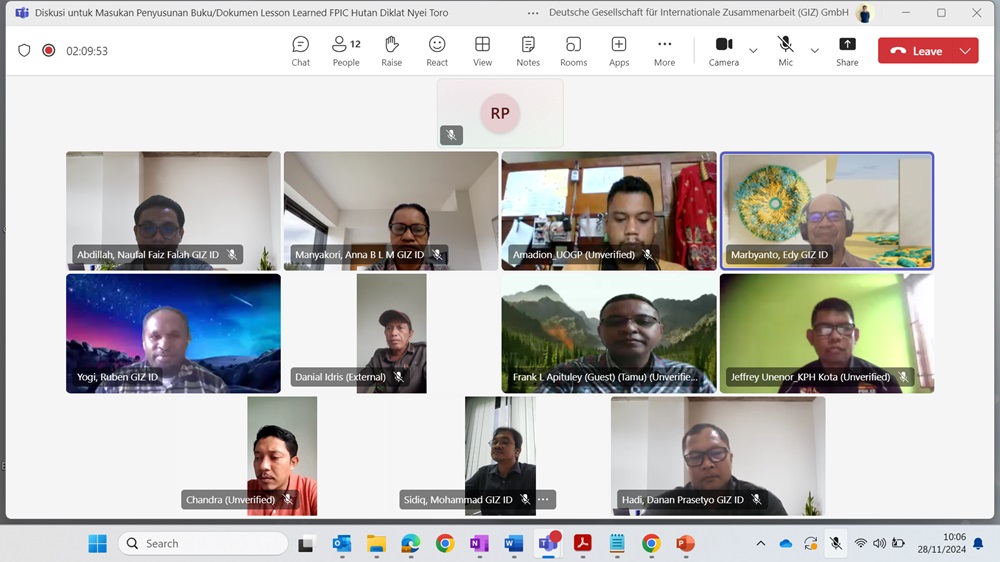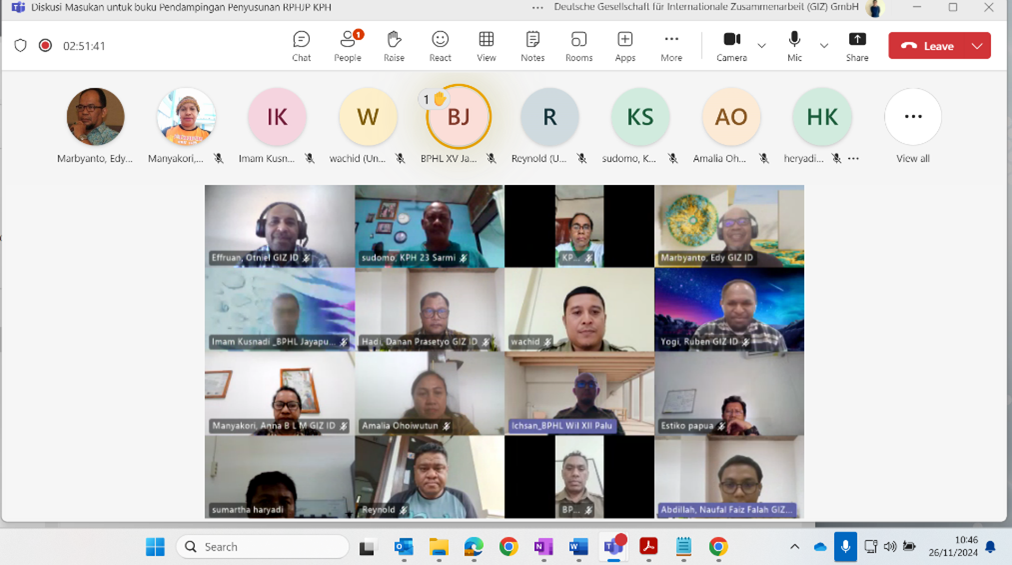FORCLIME
Forests and Climate Change ProgrammeTechnical Cooperation (TC Module)

Select your language

FORCLIME is currently preparing a lessons-learned document on the facilitation of processes for the development of the Nyei Toro Educational Forest in Pasir 6, Tanjung Ria Village, North Jayapura Regency, Papua Province. Through participatory mapping, the area handed over by the customary rights owner community, Necheibe Ormu, and for which an educational forest use agreement has been decided amounts to 144.92 ha. The facilitation was initiated through a process of public consultation known as Free, Prior, Informed and Consent (FPIC). The goal behind the implementation of the FPIC process is to ensure that the good intentions of the Necheibe traditional community who have handed over part of their customary territory are realised as a collective decision of the community and is ultimately voluntary in nature without any coercion and with full awareness of the relevant consequences and risks.
In order to obtain input for the lessons-learned document that is being developed, FORCLIME collected information through the distribution of questionnaires, then followed up with an online meeting on 28 November 2024 with stakeholders involved in the FPIC process. The parties involved in the distribution of the questionnaires and online discussions include the Necheibe Traditional Community, Ottow Geissler University in Papua, the Papua Provincial Forestry and Environment Service, the Natural Resources Conservation Center (BBKSDA) Papua, the Papua Regency Government, the Traditional Peoples Task Force (GTMA) and the forest management unit of Kota Jayapura. These meetings, which were held online, were aimed at the gathering of inputs and testimonies from the relevant stakeholders that will ultimately reveal important narratives. These narratives can then be used as testimonies so that the contents of the resulting document will be complete and able to capture storytelling from various sides.
“I think the FPIC process carried out with FORCLIME has been conducted fairly and transparently. All FPIC principles have been successfully implemented. In addition, this process has also been well documented as evidence of openness and accountability,” explained the Head of the Forestry Study Programme at Ottow Geissler University, Papua, Mr. Frank Leonardo Apituley, S.Hut., M.Si.
In the wake of these meeting, a lessons-learned document about facilitation processes during the development of the Nyei Toro Educational Forest will be finalized. The hope is that this document will be made available to the parties concerned during the first semester of 2025.
For more information, please contact:
Naufal Abdillah, Junior Advisor for Capacity Development SDM
Danan P. Hadi, Advisor for Remote Sensing/GIS and eLearning
Edy Marbyanto, Manager for Strategic Capacity Development SDM

Since 2021, FORCLIME has supported and assisted in the preparation of the Long-Term Forest Management Plan (RPHJP) for Forest Management Units (KPH) within three provinces in its working area, specifically Southwest Papua, Papua and Central Sulawesi. FORCLIME believes that the process of assisting with these activities is important and needs to be properly documented so that it can be turned into learning materials that can subsequently be used by other stakeholders. In this regard, inputs and opinions from the stakeholders involved in the preparation of the RPHJP for KPH are required so that the lessons learned document that is being prepared can be both comprehensive and objective.
As a result, FORCLIME decided to collect inputs and opinions from relevant stakeholders by distributing questionnaires which were subsequently verified during an online meeting that was held on 26 November 2024. The purpose of this meeting was to gather information from FORCLIME's partners regarding:
- Their experience during the preparation of RPHJP of KPH, such as supporting factors, challenges and recommendations for the preparation of future forest management plans.
- Opinions related to the role of FORCLIME during its support for the preparation of RPHJP of KPH.
The meeting was attended by participants from various government agencies operating within three provinces, specifically: Southwest Papua, Papua and Central Sulawesi, including the Forestry Service, KPH and various technical implementing units of the Ministry of Environment and Forestry (Watershed Management Center-BPDAS and Sustainable Forest Management Center-BPHL), which have the task of facilitating the preparation of production forest and protected forest management plans.
“FORCLIME's assistance during the preparation of the KPH’s RPHJP was initiated through the development of a biogeophysical and socio-cultural database. This process then continued with the development of a spatial database, which can be used by the KPH in relation to various types of analyses, such as forest management, FoLu Net Sink and so on,” explained the Head of the Forest Resources Utilization Section, Environment, Forestry and Land Service of the Province of West Papua, Mr. Reynold Kesaulija, S.Hut. M.Si, who previously served as the Head of the South Sorong Production Forest Management Unit.
After this meeting, FORCLIME will refine the lessons learned document for the mentoring process for use during the preparation of the KPH Long-Term Forest Management Plan. This document is expected to be made available in early 2025.
For more information, please contact:
Danan P. Hadi, Adviser for Remote Sensing/GIS and eLearning
Edy Marbyanto, Strategic Area Manager for Human Capacity Development

The Data and Information Center (Pusdatin) at the Ministry of Environment and Forestry (KLHK), facilitated and supported by FORCLIME, carried out a consolidation and evaluation of sectoral statistical data held in the One Data Indonesia (SDI) system on 12 November 2024 at the Manggala Wanabakti Building, Jakarta. The meeting was led by the Head of Pusdatin, Mr. Ardi Risman, S.Hut., M.T., M.PSc. and involved input from a speaker from the SDI Secretariat, Bappenas, Mrs. Nuzulul Azizah Ramdan Wulandari, as well as a speaker from the Central Statistics Agency (BPS), Mrs. Triana Rachmaningsih. The meeting was attended by various KLHK units responsible for data and statistics management and was organized in an effort to improve collaboration between institutions, as well as to consolidate and evaluate the implementation of the various principles that underlie the One Data Indonesia system and the management of sectoral statistics as they fall under the scope of the KLHK. The ultimate goal is to ensure that the preparation of all forestry and environmental policies is data-based.
In order to realize accurate, up-to-date and sustainable data, the Ministry of Environment and Forestry formed the One Data Forum of the Ministry of Environment and Forestry at the end of 2022. This forum provides guidance and training on the Electronic-Based Government System (SPBE) to representatives of all Echelon I units working at the Ministry of Environment and Forestry in order to support the implementation of SDI.
Following the consolidation and evaluation meeting, Pusdatin will work closely with BPS and SDI to ensure that KLHK data coordinators and producers meet the SDI standards. Furthermore, the Ministry of Environment and Forestry will prepare a One Data implementation roadmap that will feature clear targets and success indicators.
In addition, the Ministry of Environment and Forestry will draw up a set of technical guidelines that will be used by Data Coordinators and Producers to ensure metadata compliance and that classification updates are implemented in accordance with agreed standards. Finally, information on One Data policies, standards and procedures will be disseminated continuously to related units at the Ministry of Environment and Forestry in an effort to strengthen data management practices.
For more information, please contact:
Fadhilatunnisa Nurhadiza, Junior Adviser for Sustainable Forest Management
Mohammad Rayan, Technical Adviser for Cross-Cutting Issues and Conflict Management
Wandojo Siswanto, Strategic Area Manager for Forest Policy and Climate Change
 |
Supported By: |
  |